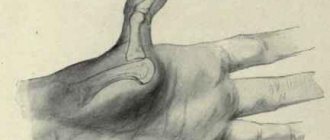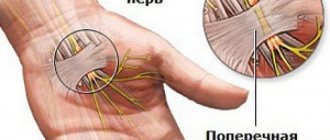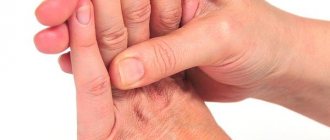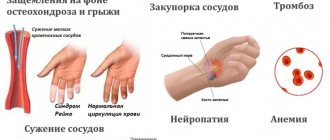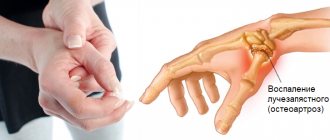My hands are going numb
Numbness is a loss of sensation in any part of the body. Numbness may be accompanied by a tingling sensation, goosebumps, burning, tightness of the skin, as well as a feeling of cold in the numb part of the body. The most common complaints are numbness of the extremities - hands (sometimes they talk about numbness of the fingers) or legs.
We perceive numbness as a loss of signal: nerve impulses from the numb area do not reach the brain. In most cases, the cause is local in nature and consists of damage to peripheral nerves or a violation of local circulation, as a result of which the nerves are deprived of the necessary nutrition. However, sometimes numbness is a symptom of a central nervous system disorder.
Physiological causes of numbness
Numbness occurs with prolonged immobility. Whatever position we are in, some vessels become pinched, and we risk that the nerve endings, which do not receive proper nutrition, will lose sensitivity. Our body must move, changing the areas that have been subjected to compression, and then we will not be in danger of numbness. This usually happens during the day. But during deep sleep, we can lie in the same position for quite a long time without changing posture. And then, when we wake up, we notice that we have rested some part of our body, for example, a hand placed under our head.
Numbness is caused by exposure to cold. When in contact with cold air, the skin loses sensitivity. Local blood circulation is disrupted, and we cease to feel the nerve endings. If this situation lasts longer, frostbite is possible, but in most cases it is enough to rub the area of skin that has lost sensitivity or return to warmth, blood circulation will be restored and the numbness will go away.
If numbness occurs without an obvious connection with a specific situation, then it probably has a pathological cause.
Does it make a difference on which hand the fingers go numb?
Pathologies of the cardiovascular system may be indicated by impaired sensitivity in the fingers of the left hand. It is dangerous to ignore this symptom: it is often one of the indicators of a pre-infarction condition or an impending stroke. The fingers of the right hand often go numb with the development of arthritis, osteochondrosis or carpal tunnel syndrome. This may also be due to an uncomfortable position of the torso during sleep.
Numbness as a symptom
Numbness can be caused by:
- pinched nerve. A pinched nerve can occur at the point where it exits the spinal canal ( radicular syndrome
).
Therefore, numbness is a typical symptom of osteochondrosis and other spinal diseases. The nerve can also be pinched in other areas. Pinching of a nerve in its natural canal (tunnel) is defined as tunnel syndrome
.
The most common is carpal tunnel syndrome
(a pinched nerve in the wrist).
In this case, the fingers go numb. Office work (using a keyboard and mouse) contributes to the development of the disease. Also quite common is ulnar nerve neuropathy
, the development of which is facilitated by the need for prolonged support with the elbow (typical of working at a computer).
Wearing a belt, pressing the thigh against the edge of the table, or inconvenient objects in pockets can lead to pinching of the external cutaneous nerve of the thigh ( Roth disease
) - the most common foot tunnel syndrome; - injury. Trauma can disrupt the integrity of nerve fibers, resulting in loss of sensation in the area supplied by the damaged nerve;
My legs are going numbproblems of peripheral circulation. For example, the development of atherosclerosis of the vessels of the lower extremities leads to disruption of the blood supply to the legs (primarily the feet). A lack of fresh blood flow manifests itself as pale skin, a local decrease in body temperature, and numbness. Numbness may also accompany a violation of the venous outflow of blood (chronic venous insufficiency);
- anemia (decreased hemoglobin in the blood). The reasons may be problems with the intake or absorption of iron, vitamins (B12, folic acid);
- polyneuropathy - multiple lesions of peripheral nerves. Polyneuropathy can be a consequence of diabetes mellitus, alcoholism, poisoning, long-term use of certain medications, autoimmune diseases, metabolic disorders and other systemic pathologies;
- diseases of the central nervous system - such as brain tumors, cerebrovascular accidents, multiple sclerosis.
The little finger and ring finger on the left hand are going numb: reasons
Impaired sensitivity of the upper extremities can be observed against the background of lesions of the spine, blood vessels, and nerves. Often the cause is osteochondrosis. Thus, this pathological condition is observed in many patients with C4-C5 disc herniation.
When various nerves are compressed, a person may experience numbness in certain fingers. Thus, pain and numbness of the thumb, middle and index fingers occur in patients with carpal tunnel syndrome (damage to the median nerve), little finger and ring finger - ulnar nerve, etc.
Long-term impairment of the sensitivity of the little finger can be observed when the nerve is pinched and inflamed, which can occur against the background of systematic stress on the limb (work conditions, sports) and certain diseases.
This pathological condition can also develop with:
- injuries to the fingers and/or elbow joint;
- coronary heart disease;
- stroke and pre-stroke condition;
- pathologies of the nervous system;
- multiple sclerosis.
If a person experiences numbness in only the tip of the little finger, this may indicate the presence of pathologies in the wrist, elbow, shoulder joints, chronic cardiovascular diseases, autoimmune diseases, neuropathy, endocrine diseases, and tumors.
Impaired sensitivity and swelling of the hands are quite often observed in pregnant women and women during menopause.
Risk factors include:
- renal failure;
- diabetes;
- rheumatoid arthritis;
- hormonal imbalances;
- overweight;
- wrist deformity due to fractures;
- alcohol abuse.
Atherosclerosis and thrombosis can contribute to the development of pathology. The cause of numbness in the hands may be a lack of vitamins in the body (especially A and group B).
Numbness can occur during sewing, knitting, playing musical instruments, prolonged work at the computer, or uncomfortable body position during sleep.
Carpal tunnel syndrome is an occupational disease and can occur in pianists, drummers, artists, sign language interpreters, and representatives of other professions who perform monotonous flexion-extension movements with their hands.
In what cases should you consult a doctor if you have numbness?
If the numbness has a physiological cause, that is, caused by a temporary disruption of the local blood supply, then it is enough to change the position and rub the numb area, and sensitivity will be restored. If the numbness does not go away, then the cause is more serious and you should consult a doctor.
It is necessary to get emergency medical help if numbness is accompanied by symptoms of damage to the central nervous system:
- headache, dizziness, attacks of weakness, double vision, loss of coordination;
- unexpected bowel movements or sudden urination;
- speech problems.
These symptoms may occur after a head, neck, or back injury.
You should also consult a doctor if:
- numbness occurs periodically and without an obvious reason;
- thermal perception is impaired (for example, the ability to distinguish between warm and cold water is impaired);
- Numbness is preceded by pain and loss of range of motion in one of the joints.
Main symptoms of upper limb cramps
You can diagnose cramps in the hands and fingers yourself. The attack is accompanied by stiffening of the muscles. Heaviness and pain appear in the upper extremities.
In some cases, the hand may automatically clench into a fist. Sometimes, on the contrary, the palm extends in the opposite direction. During an attack, the fingers begin to tremble.
During an attack, you may feel a sharp or nagging pain. Some people experience goosebumps running across the skin, which is accompanied by a tingling sensation.
If rhythmic twitching appears during an attack, then these are clonic convulsions.
Numbness of the index finger and thumb
Osteoporosis primarily affects the big toes of the upper extremities. If you do not start urgent treatment, your fingers will become insensitive. In the future, a person will not be able to bend them at all. Some people experience numbness in several fingers at once. Numbness of these fingers can cause inflammation or damage to the intervertebral and cervical discs. They in turn compress the roots of the nerves.
Numbness serves as a kind of warning when there is heavy load on the neuromuscular system. As a rule, this disease affects people who perform monotonous manual work for a long time. The main symptoms are constrained movements, cramps, cramping of the fingers.
Ring and middle fingers
Systematic numbness of certain areas indicates the presence of a serious disease. A numb ring finger may indicate a disorder of the cardiovascular system. Patients note that the numbness intensifies at night, and in the morning only a slight tingling remains. The finger begins to go numb from the tip, and over time the unpleasant sensation spreads to the entire hand.
If numbness occurs on the back of the ring finger, this indicates the development of a disease of the elbow joint. This area also becomes numb when the brachial nerve is pinched. The pain radiates from the outside of the arm. The patient feels unwell. My hands constantly hurt.
Finger discomfort can be caused by alcoholism or smoking. Regular poisoning of the body can cause numbness and cramps in the fingers.
At the initial stage, the fingertips on the palm side become numb. Over time, the discomfort reaches the forearm. This can cause weakness in the upper limbs. Over time, pain and numbness spread to the shoulder and forearm.
Numbness of the little finger
If your little finger goes numb at night, this is a sign of a cardiovascular disorder. Pain and discomfort may begin in the little finger and eventually move to the inside of the forearm.
Which doctor should I contact for numbness?
Numbness is a neurological symptom, so if you complain of numbness, you should consult a neurologist. You must be prepared for the fact that a medical examination is only the first stage in solving the problem. Further instrumental studies will be required: MRI (for radicular syndrome), electroneurography, ultrasound (shows a picture of blood flow in the area under study), EEG (performed if diseases of the central nervous system are suspected). There may also be a need for laboratory tests (complete blood count, blood test for hormones, test for vitamins, etc.).
Treatment for numbness is aimed, first of all, at eliminating the cause that caused it, that is, the disease whose symptom is numbness is subject to treatment. In some cases this may require considerable time.
If you are concerned about numbness in your fingers, arms or legs in general, or any other area of the body, contact the nearest clinic of JSC “Family Doctor”. Our neurologists will determine the cause of the numbness and prescribe adequate treatment. Therapeutic activities may include physiotherapy, physical therapy, massage, reflexology, manual therapy - this entire range of services is provided in the Family Doctor JSC network. Surgical treatment is carried out in the company's high-tech Hospital Center.
How does numbness in the fingers manifest under various conditions?
Typically, numbness is most felt in the fingertips.
| State | Signs |
| Nerve compression, development of the inflammatory process | In addition to numbness, the patient may experience nagging pain and discomfort in the affected limb |
| Atherosclerotic lesion of blood vessels | The person may also experience a tingling or crawling sensation. |
| Cerebrovascular accident | In addition to numbness, the patient may experience headache, dizziness, speech and movement disturbances, muscle weakness, paralysis |
| Complicated cervical osteochondrosis | Numbness of the little and ring fingers on both hands |
| Vitamin deficiency | In addition to numbness of the fingers, peeling of the skin of the palms may occur. |
